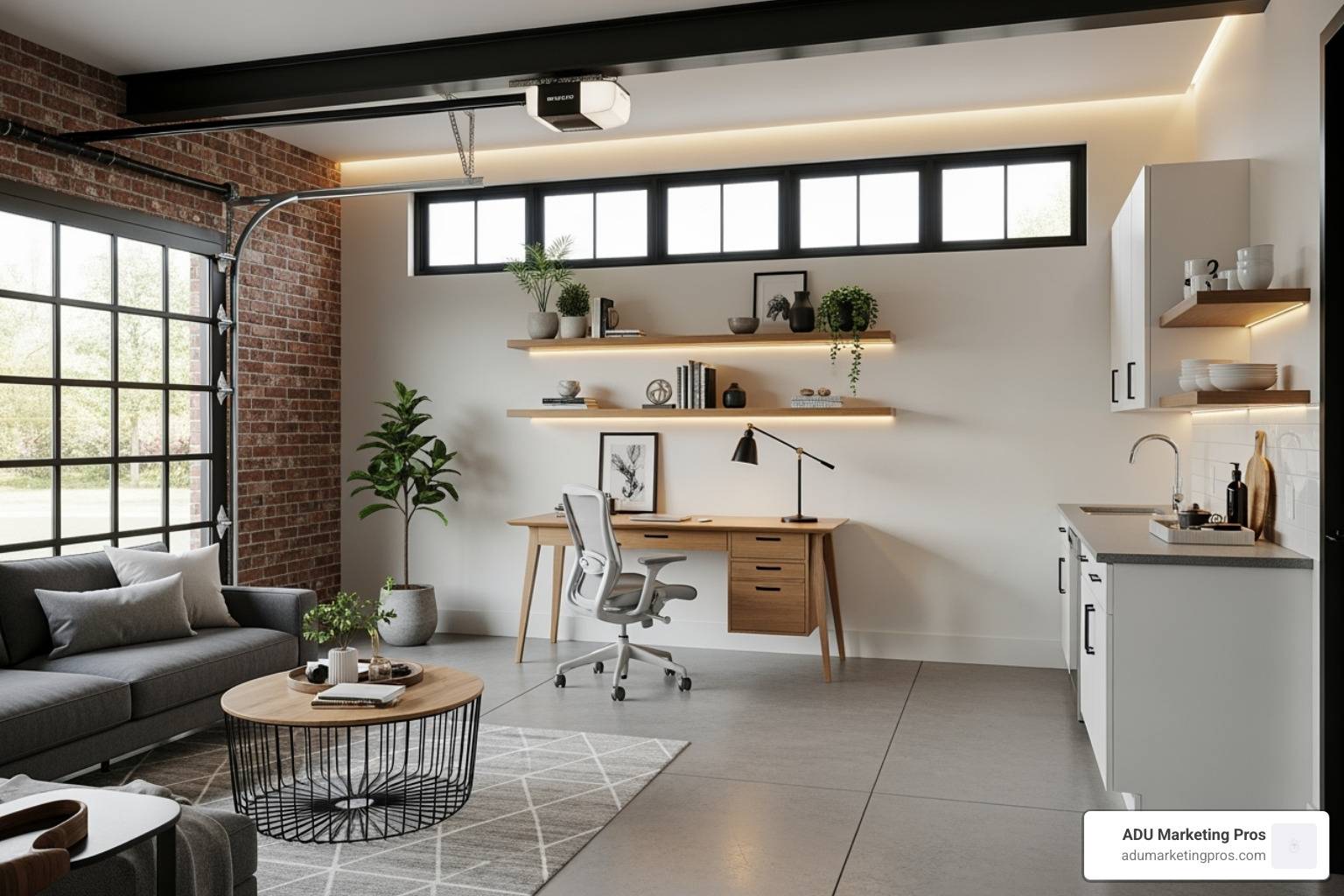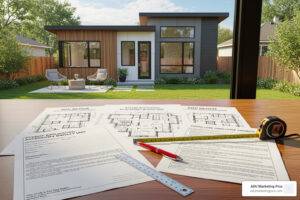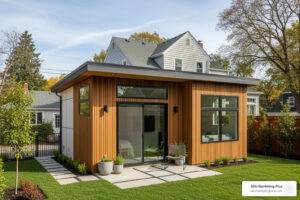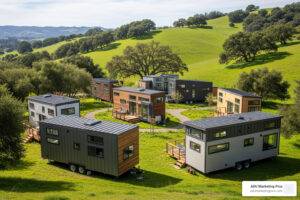Why Understanding Garage Conversion Costs Is Essential Before You Build
How much do garage conversions cost? It’s the first and most critical question homeowners ask. As the demand for flexible living space skyrockets due to the rise of remote work, multi-generational households, and a challenging housing market, garage conversions have emerged as a brilliant solution. But the answer to the cost question is complex, varying significantly based on your goals, location, and the project’s scope.
Quick Answer: Garage Conversion Cost Ranges
- Basic conversion (home office, gym): $6,000 – $12,000
- Mid-range conversion (bedroom, living room): $12,000 – $25,000
- High-end conversion (guest suite): $25,000 – $50,000
- Full ADU conversion: $40,000 – $75,000+
- National average: $16,199
Converting your garage is an attractive and cost-effective alternative to a traditional home addition, which can easily cost $22,000 to $82,000 or more. The wide cost range for conversions reflects the vast difference between finishing the walls for a simple home office and constructing a full Accessory Dwelling Unit (ADU) with a kitchen, bathroom, and separate entrance.
Budget creep is a real and common risk. A project initially quoted at $10,000 can quickly escalate to $15,000 or more if your contractor discovers the foundation has an unaddressed crack or the existing electrical panel can’t support the new load. Understanding these potential costs upfront is the key to planning a realistic budget and avoiding stressful surprises.
This comprehensive guide will break down every cost factor, from architectural plans and permits to demolition and final inspections. You’ll learn what drives costs up, where you can save, and how to budget effectively, whether you’re planning a basic workspace or a full-fledged rental unit.
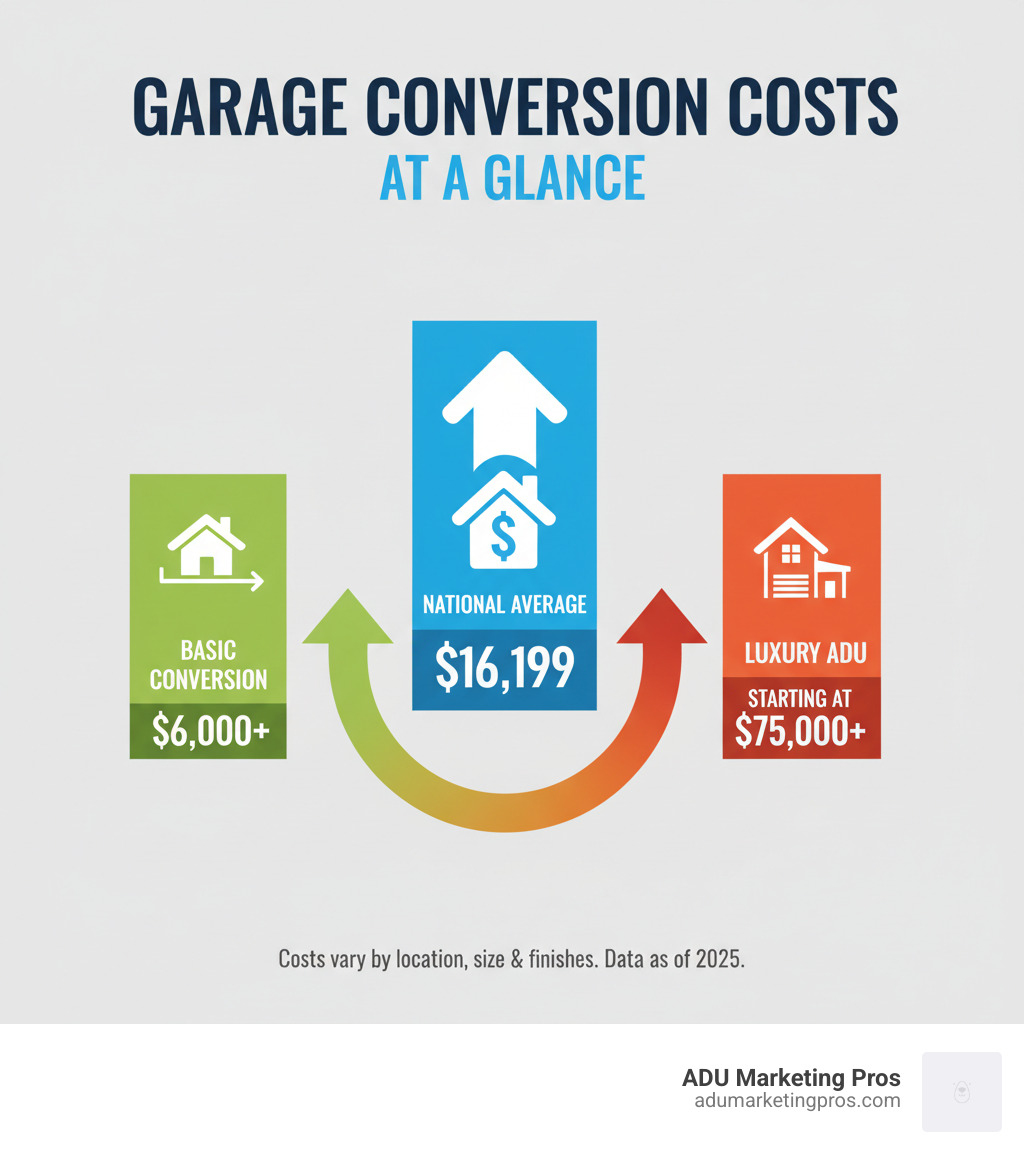
Average Garage Conversion Cost Breakdown
Understanding how much do garage conversions cost is clearer when broken into tiers. The national average is around $16,199, but this figure can be misleading without context. A simple home office might cost $6,000, while a full rental unit (ADU) could exceed $75,000, depending on the project’s complexity, material choices, and local labor rates.
- Basic conversions create a finished, conditioned space with minimal changes to existing utilities.
- Mid-range projects add better finishes, dedicated climate control, and potentially a half-bath.
- High-end conversions involve custom features, premium materials, and often a full bathroom.
- ADU conversions create a legally separate, rentable dwelling unit with a full kitchen, bathroom, and its own entrance, requiring extensive permits and utility work. For more on this, see our guide on ADU Building Costs.
Here’s how the different conversion tiers compare:
| Tier | Average Cost Range | Typical Use Case | Key Features |
|---|---|---|---|
| Basic | $6,000 – $12,000 | Home Office, Gym, Playroom | Basic finishes, new lighting, insulation, minimal plumbing/electrical work. |
| Mid-Range | $12,000 – $25,000 | Bedroom, Living Room | Upgraded finishes, new windows, dedicated HVAC, possible half-bath. |
| High-End | $25,000 – $50,000 | Guest Suite, In-Law Unit | Custom cabinetry, high-end flooring, full bathroom, extensive plumbing. |
| ADU | $40,000 – $75,000+ | Rental Apartment, Separate Home | Full kitchen, full bathroom, separate entrance, separate utilities, extensive permits. |
How much do garage conversions cost based on size and type?
Your garage’s size and whether it’s attached or detached fundamentally shape your budget.
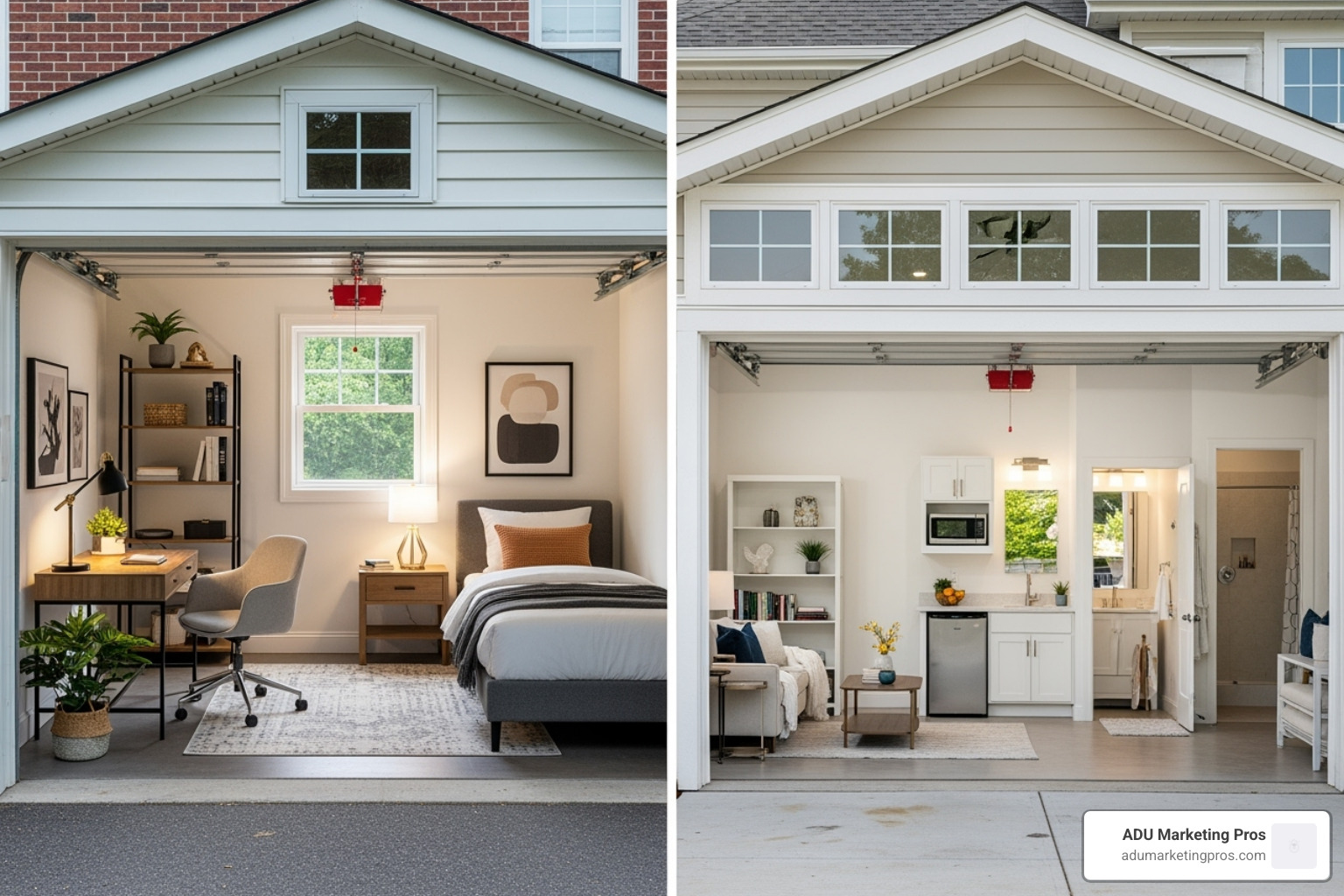
- Single-car garages (approx. 200-240 sq ft) are perfect for a home office, gym, or single bedroom, typically costing $6,000 to $18,000.
- Double-car garages (approx. 400-480 sq ft) can become spacious master suites, family rooms, or studio apartments, with costs ranging from $11,000 to $33,000. The price doesn’t simply double, as fixed costs like permits, design fees, and project management are spread over a larger area.
- Attached garages generally make it cheaper and easier to tap into the main house’s existing electrical, plumbing, and HVAC systems. Detached garages cost more upfront due to the need to run utility lines underground but offer superior privacy, making them ideal for rental ADUs or secluded home offices.
How does geographic location influence pricing?
Your zip code is one of the most significant cost factors. A project in a high-cost-of-living urban area could cost 50-100% more than the exact same project in a rural or suburban part of the Midwest. This difference is driven primarily by local labor rates and the cost of permits.
California is a prime example of a high-cost market. Intense demand for ADUs, stringent building codes (including seismic requirements), and high labor costs all inflate budgets. In Los Angeles, complex zoning rules and permit processes are major factors, which we explore in our Garage Conversion Los Angeles guide. Bay Area pricing in cities like San Jose and Palo Alto is among the highest in the nation due to extreme housing demand and a shortage of skilled labor. In contrast, a similar mid-range conversion in a city like Columbus, Ohio, might cost $15,000 to $20,000, whereas in San Diego it could be $25,000 to $35,000.
Material costs also fluctuate regionally, though to a lesser extent than labor. The only way to get a true sense of costs in your market is to obtain multiple, detailed quotes from qualified local contractors.
What Factors Influence How Much Garage Conversions Cost?
Beyond square footage and location, how much do garage conversions cost depends on the specific choices you make for every component of the project. The final price is a sum of many parts, from major structural work to the style of the light fixtures.
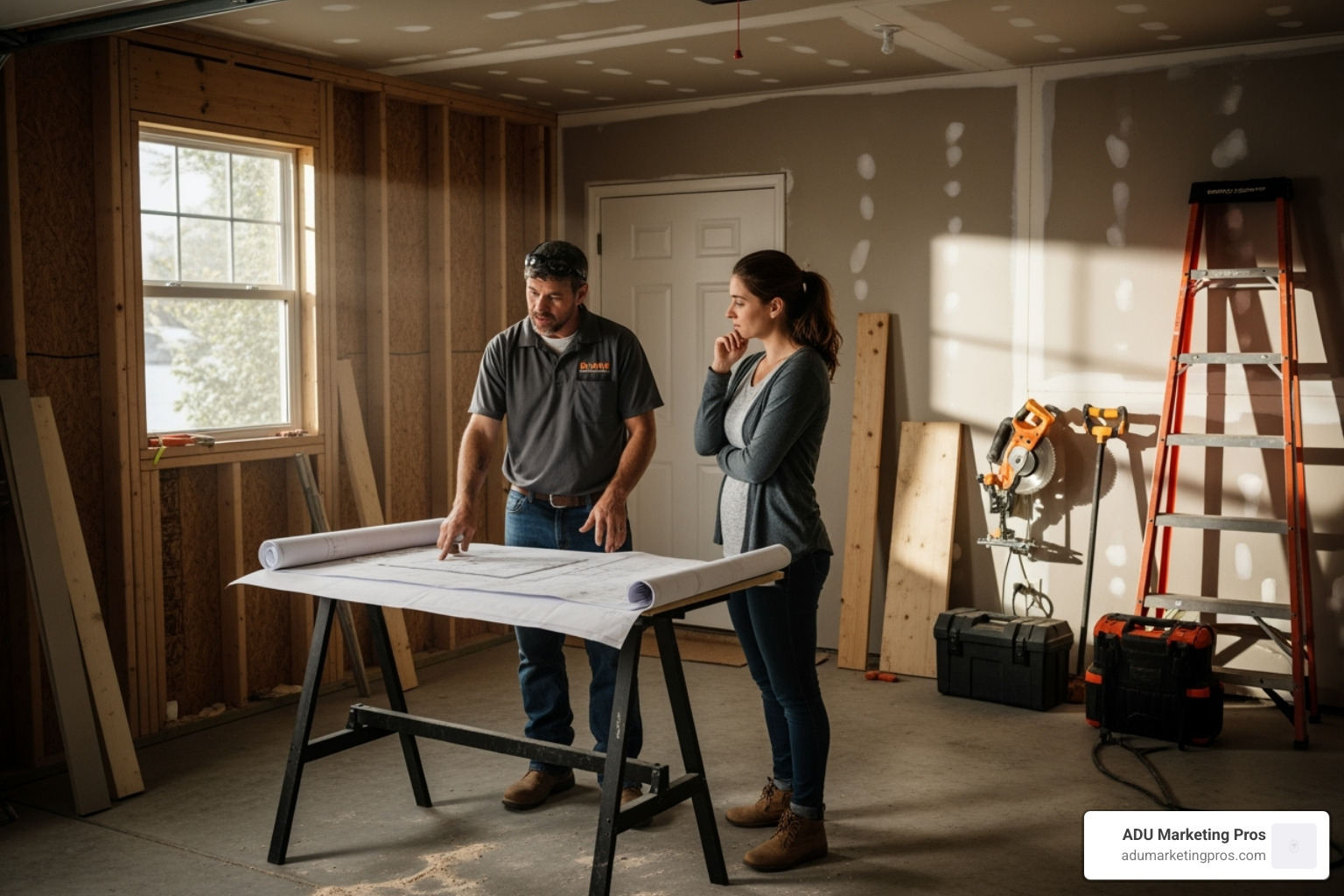
- Scope of Work: This is your biggest cost driver. A basic office is far cheaper than a full apartment with a kitchen and bathroom. Every added feature—a half-bath, a kitchenette, a separate entrance—increases the budget.
- Material Quality: Premium materials like engineered hardwood floors ($12-$20/sq ft installed) cost significantly more than budget-friendly options like luxury vinyl plank ($5-$10/sq ft installed). This principle applies to every finish, from windows and doors to countertops and fixtures.
- Labor Costs: Skilled labor typically accounts for 10-20% of the total budget, and more for complex projects. While it’s tempting to cut costs here, hiring licensed and insured professionals is crucial for safety, code compliance, and preventing expensive future repairs.
- Unforeseen Issues: Garages can hide surprises. Opening up walls might reveal termite damage, mold from a hidden leak, or an outdated electrical system. It is essential to add a 10-20% contingency fund to your budget to cover unexpected problems like these.
Structural Changes and Preparation
Before any cosmetic work can begin, your garage must be structurally prepared to function as a safe and comfortable living space.
- Demolition: Removing the garage door, old shelving, and sometimes interior walls averages around $1,500 – $2,500, including debris removal.
- Foundation: A structural engineer must inspect the concrete slab. Garages are often built on a monolithic slab that may not be suitable for a living space without modification. Any cracks must be repaired ($250-$800 each), and in some cases, the entire slab may need a new layer of concrete poured on top.
- Leveling the Floor: Garage floors are sloped for drainage. Leveling the surface with a self-leveling compound is necessary and costs $500 to $5,500, depending on the size and condition of the slab.
- Wall Framing and Reinforcement: Existing garage walls may need additional framing to meet residential building codes, support drywall, and create cavities for insulation. This typically costs $1,000 to $5,000. In earthquake-prone areas, seismic retrofitting may be required.
- Garage Door Replacement: The large opening must be framed, sheathed, insulated, and finished. Converting it to a solid wall with a standard window runs $1,300 to $2,000. Installing a new entry door adds $500 to $2,000.
How much do garage conversions cost for essential utilities?
Upgrading utilities from car-storage standards to human-living standards is a major and non-negotiable expense.
- Electrical: Most garages require a complete electrical overhaul. A living space needs far more outlets, dedicated circuits for appliances, and proper lighting. Installing a new subpanel is often necessary ($1,200 – $2,500). The total electrical upgrade, including new wiring, outlets ($150-$800 each), and lighting fixtures, can range from $2,000 to $8,000.
- Plumbing: This is a major cost driver. Simply running new supply and drainage lines for a future bathroom can cost $1,500 to $4,000. A complete, small bathroom installation (toilet, sink, shower) can add $15,000 to $30,000 to the project total. Kitchen plumbing is similarly expensive. These costs are a huge part of any ADU project, as detailed in our ADU Construction Cost guide.
- HVAC: To ensure year-round comfort, you’ll need a climate control system. Ductless mini-splits are a popular and efficient choice, costing $1,500 to $4,500 for a single-zone unit. Extending your home’s existing central air costs $3,000 to $5,000, but you must first have an HVAC professional confirm your system can handle the extra load.
Finishing Costs: From Floor to Ceiling
These are the final touches that transform the space from a construction zone into a home.
- Insulation: Proper insulation is crucial for comfort and energy efficiency. Insulating walls and ceiling typically costs $500 to $2,500. For guidance on selecting the right R-value for your climate, consult resources like Energy Star. Soundproofing can add another $300 to $500 for basic noise reduction.
- Drywall: Hanging, taping, and finishing drywall to create smooth, paintable walls typically costs $1,500 to $3,500.
- Flooring: New flooring is a must. Costs per square foot range from $3-$7 for carpet, $5-$10 for vinyl plank, $8-$15 for tile, and $12-$20 for hardwood. Total flooring costs often fall between $1,500 and $5,000.
- Painting: A professional paint job provides a clean, finished look and costs $1,000 to $3,000.
- Carpentry and Trim: Baseboards, window and door casings, and built-in closets add a polished look. Expect to pay around $4,000 to $7,000 for custom carpentry in a typical conversion.
- Windows and Doors: New windows ($500-$2,000 each) are essential for light and egress. Interior doors ($226-$824 each) help define the new space.
Permits, Plans, and Professional Fees
Proper permits and plans are non-negotiable for a safe, legal conversion that adds value to your home.
- Architectural Plans: Complex conversions and all ADUs require professional plans, which can cost $2,000 to $20,000. These are essential for securing permits and providing clear instructions to your contractor. Our ADU Building Plans guide explains this phase in detail.
- Structural Engineer: For any changes to the foundation, walls, or roof structure, an engineer’s review and stamp are required. Fees range from a $250-$500 consultation to 1-5% of the total project cost.
- Permits: Basic conversion permits cost $500 to $1,500. ADU permits are far more extensive and can cost $2,000 to $10,000 or more, depending on the jurisdiction. California has specific ADU regulations, which we cover in our ADU Permit Cost California resource.
- Inspections: Fees are usually included in the permit cost and cover multiple site visits by city inspectors (e.g., for foundation, framing, electrical, plumbing) throughout the project.
Cost Estimates by Conversion Type
The intended use of your converted garage is the single biggest factor in determining how much do garage conversions cost. A simple project has vastly different requirements—and a very different price tag—than a fully independent living unit.
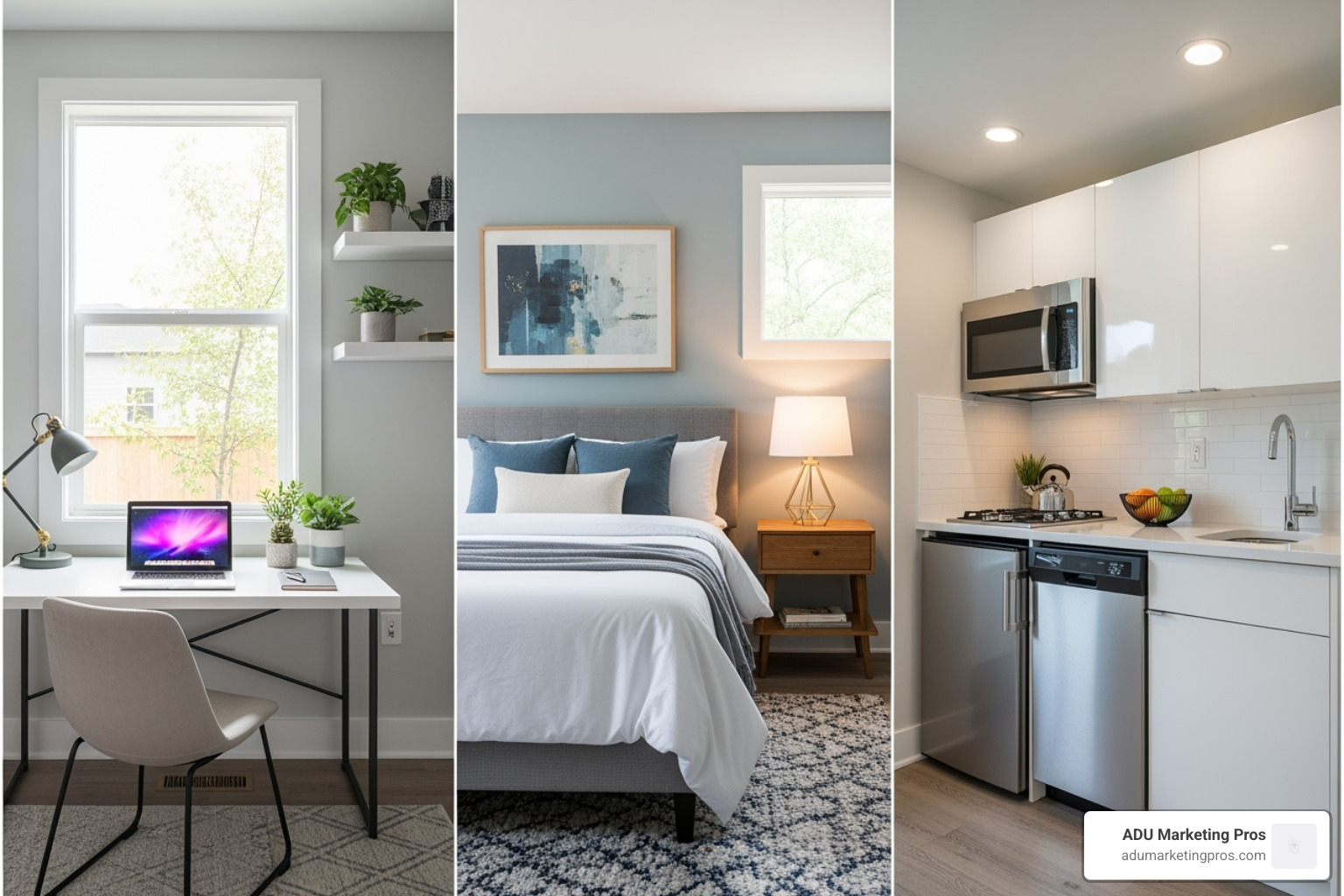
Home Office or Gym Conversion
This is the most budget-friendly option, typically ranging from $8,000 to $16,000. These conversions require minimal or no plumbing, which keeps costs down significantly. The budget focuses on creating a comfortable, functional, and finished space:
- Electrical System: Upgrades are needed to safely handle computers, monitors, printers, and specialized exercise equipment. This often includes adding multiple outlets and potentially a dedicated circuit.
- Insulation and HVAC: These are essential for creating a space you can comfortably use year-round, whether you’re on a video call or a treadmill.
- Lighting: Quality lighting is critical. A home office needs layered lighting to reduce eye strain and help you focus on your work without distractions. A gym benefits from bright, energizing light.
- Connectivity: For a home office, you may need to run ethernet cables or install a mesh Wi-Fi system to ensure a stable internet connection.
Bedroom or Guest Suite Conversion
Converting a garage into a bedroom or guest suite typically costs between $10,000 and $25,000. The complexity and code requirements increase, as does the price.
- Egress Window: Building codes universally mandate that any legal bedroom must have at least one window large enough for emergency escape. This is a non-negotiable safety feature that involves cutting a large opening in an exterior wall.
- Closet: Adding a closet is a straightforward framing job but is essential for the room to be classified and function as a bedroom.
- En-Suite Bathroom: This is the biggest potential cost driver. Adding even a small bathroom can cost an additional $15,000 to $25,000 due to the extensive plumbing and finishing work. However, it transforms the space from a simple bedroom into a true guest suite and adds significant functional and financial value.
Accessory Dwelling Unit (ADU) Conversion
ADU conversions are the most ambitious and expensive option, costing $40,000 to $75,000+, with many projects in high-cost areas easily exceeding $100,000. You are essentially building a small, self-contained apartment within the shell of your garage.
An ADU requires everything a home needs: a full kitchen, a complete bathroom, and a separate, private entrance. This involves extensive and costly plumbing, electrical, and HVAC work. The permit process is also far more complex and expensive than for a simple conversion. Many jurisdictions now require or recommend separate utility meters for ADUs, which adds another layer of cost and coordination. California has been a leader in encouraging ADU development, but this comes with a complex web of state and local rules. Our guides on Garage Conversion to ADU and California ADU Regulations can help you navigate the process. Despite the high upfront cost, ADUs often provide the best long-term return on investment through rental income or by providing housing for family members.
Maximizing Value: ROI and Cost-Saving Strategies
When considering how much do garage conversions cost, it’s crucial to think beyond the initial expense and focus on the long-term value. A well-planned garage conversion is a strategic investment that can dramatically boost your quality of life and your home’s financial standing.
The benefits can be personal, like gaining a dedicated home office that improves work-life balance, or purely financial, like the substantial rental income from an ADU. Many homeowners find that a converted garage can generate enough monthly income to cover their mortgage payment, a topic we explore in our guide on ADU Rental Income.
What is the Potential Return on Investment (ROI)?
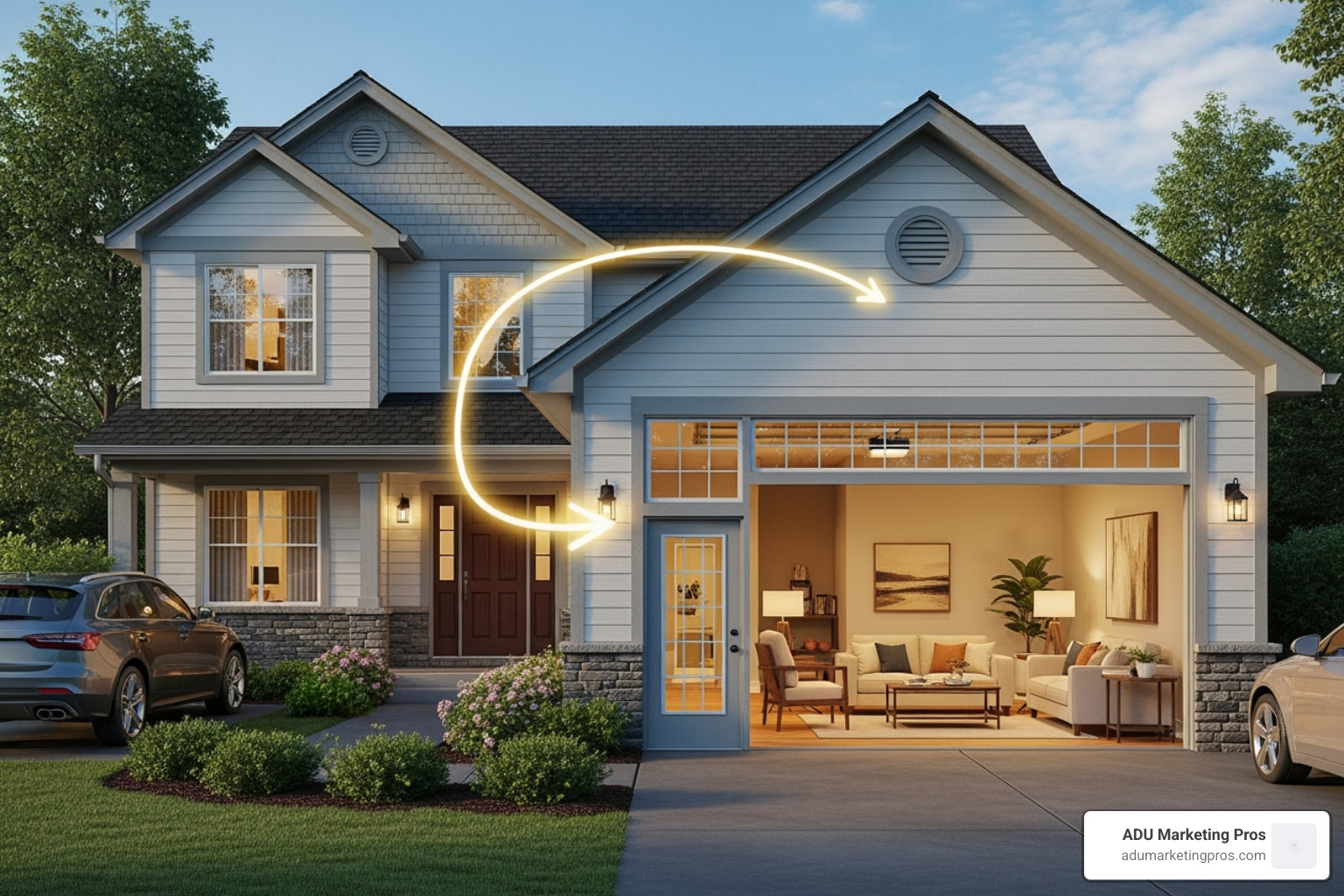
The financial returns on garage conversions are impressive. The national average ROI for a garage conversion is around 80%, according to Realtor.com, making it one of the highest-returning home improvement projects you can undertake.
A legally permitted, well-executed conversion can also increase your property value by 10-15%. On a $500,000 home, that’s an added value of $50,000 to $75,000—often significantly more than the project’s cost. Appraisers will count the converted space as part of the home’s gross living area (GLA), provided it is finished to the same quality as the rest of the house, is accessible from the main home, and has a permanent heat source.
ADU rental income takes the financial benefits to another level entirely. In many urban and suburban markets, a garage ADU can generate $1,500 to $2,500 per month in rent. That’s $18,000 to $30,000 in annual gross income, which can pay for the entire conversion in just a few years. Your specific ROI will vary based on your local rental market and the quality of your conversion. For a deeper analysis, see our guide on ADU Return on Investment.
Are there ways to save money on a garage conversion?
Managing costs effectively doesn’t mean cutting corners on safety or quality. Here are several smart strategies to reduce expenses without compromising the final product:
- DIY Smartly: Handle tasks that don’t require a license, such as demolition, cleanup, interior painting, and installing simple flooring like LVP. Always leave structural, electrical, and plumbing work to licensed professionals.
- Use Standard Sizes: Custom-sized windows and doors are a major budget-killer. Design your layout around standard, off-the-shelf sizes to save thousands.
- Schedule in the Off-Season: Contractors are busiest in the spring and summer. You may be able to negotiate more competitive pricing if you schedule your project for the slower months in late fall and early winter.
- Get Multiple, Detailed Quotes: Obtain at least three itemized estimates from qualified contractors. Don’t just choose the cheapest option; compare what’s included line-by-line to ensure you’re getting the best overall value.
- Phase the Project: If your budget is tight, complete the essential structural, utility, and permitting work first to create a legally habitable space. You can add premium finishes, custom built-ins, or landscaping later as your budget allows.
- Choose Cost-Effective Materials: Modern materials can provide a high-end look for less. Luxury vinyl plank can mimic hardwood at half the cost, and high-quality laminate countertops can offer the look of natural stone without the price tag or maintenance. For ADU kitchens, consider using stylish and affordable IKEA cabinets.
Frequently Asked Questions about Garage Conversion Costs
Homeowners often have the same valid concerns when embarking on a garage conversion. Here are detailed answers to the most common questions about cost, value, and logistics.
Is converting a garage cheaper than building a home addition?
Yes, and the savings are dramatic. A new ground-up home addition typically costs between $22,000 and $82,000, and often much more, averaging $100 to $200 per square foot. Garage conversions usually fall between $6,000 and $27,000 for a comparable amount of finished living space, averaging $50 to $150 per square foot.
The reason for the cost difference is simple: you’re working with an existing structure. The foundation, walls, and roof are already in place. This means you save tens of thousands of dollars on materials and labor for major structural work. You also avoid the significant site work, excavation, and foundation pouring required for a new addition. It’s a more cost-effective, faster, and environmentally friendly way to add valuable square footage.
How long does a typical garage conversion take?
The timeline depends heavily on the project’s complexity and, most importantly, the local permitting process.
- Planning and Design: 2 to 6 weeks. This involves finalizing your layout and having an architect or designer create the plans required for permits.
- Permit Approval: 2 to 8 weeks, but can be much longer. This is often the biggest variable. Before any work can begin, your plans must be submitted to and approved by your local building department. In busy municipalities, this step alone can take several months.
- Construction: A simple conversion (home office, gym) usually takes 2 to 4 weeks of active construction. A more complex project involving a bathroom or kitchen (like an ADU) typically requires 6 to 8 weeks of construction.
Factoring in all phases, most garage conversion projects take 3 to 6 months from the initial design concept to final inspection.
How will a garage conversion affect my property taxes and insurance?
This is a critical question. Yes, a legally permitted garage conversion will almost certainly increase both your property taxes and your homeowner’s insurance premium.
- Property Taxes: When you complete a permitted conversion, the finished square footage is added to your home’s official record. Your local tax assessor will re-evaluate your property based on its new, higher value, which will lead to an increase in your annual property tax bill. The increase is usually proportional to the value added, not the cost of the project.
- Homeowner’s Insurance: You must inform your insurance provider about the conversion. Your premium will likely increase for two reasons: your home’s replacement cost is now higher, and you have more living space to cover. If you are renting out the space as an ADU, you will need to get a specific landlord or rental dwelling policy to cover liability and protect your investment.
While no one likes paying more, these increases are a sign that you have successfully added real, recognized value to your property.
Can a garage conversion hurt my home’s resale value?
A well-executed, legally permitted garage conversion almost always adds significant value to a home, often increasing property value by 10-15% and providing an ROI of around 80%. However, a conversion can be a negative if not done correctly:
- Loss of Parking: In neighborhoods with harsh weather, limited street parking, or strict HOA rules, the loss of a covered parking spot can be a major drawback for some potential buyers.
- Loss of Storage: Garages are the primary storage area for many households. If you don’t have an alternative space like a shed or a large basement, buyers may see the lack of storage as a negative.
- Quality of Work: A poorly done, unpermitted, or awkward-looking conversion can absolutely hurt your home’s value. The work must be professional, code-compliant, and integrate seamlessly with the style and quality of the main home. A cheap, DIY-looking job will be a liability, not an asset.
Transform Your Space with Confidence
Understanding how much do garage conversions cost is the essential first step toward unlocking the hidden potential in your home. We’ve covered the full spectrum of possibilities, from a budget-friendly $6,000 home office to a comprehensive, value-generating $75,000+ ADU project.
The key takeaway is that meticulous planning is everything. A realistic budget, built on a clear understanding of the costs of structural changes, utilities, finishes, and professional fees, empowers you to make informed decisions. While location, labor rates, and material choices will always cause costs to vary, smart budgeting and a 10-20% contingency fund will help you navigate the process without derailing your finances.
The long-term value proposition is compelling. With ROI rates often exceeding 80% and the potential for significant rental income from an ADU, a garage conversion is one of the smartest investments you can make in your property. You not only gain functional space that improves your daily life but also build substantial, lasting equity.
For the ADU builders and architects reading this, presenting these kinds of transparent cost breakdowns is the key to building client trust and setting projects up for success. When homeowners understand where their money is going, they can move forward with confidence. ADU Marketing Pros specializes in helping construction and architecture firms implement this educational marketing approach to attract high-quality, well-informed leads in California’s competitive market.
Ready to take the next step? Use our Garage Conversion Cost Calculator to get a personalized estimate for your project and start the journey of transforming your underused garage into the space you’ve always wanted.

